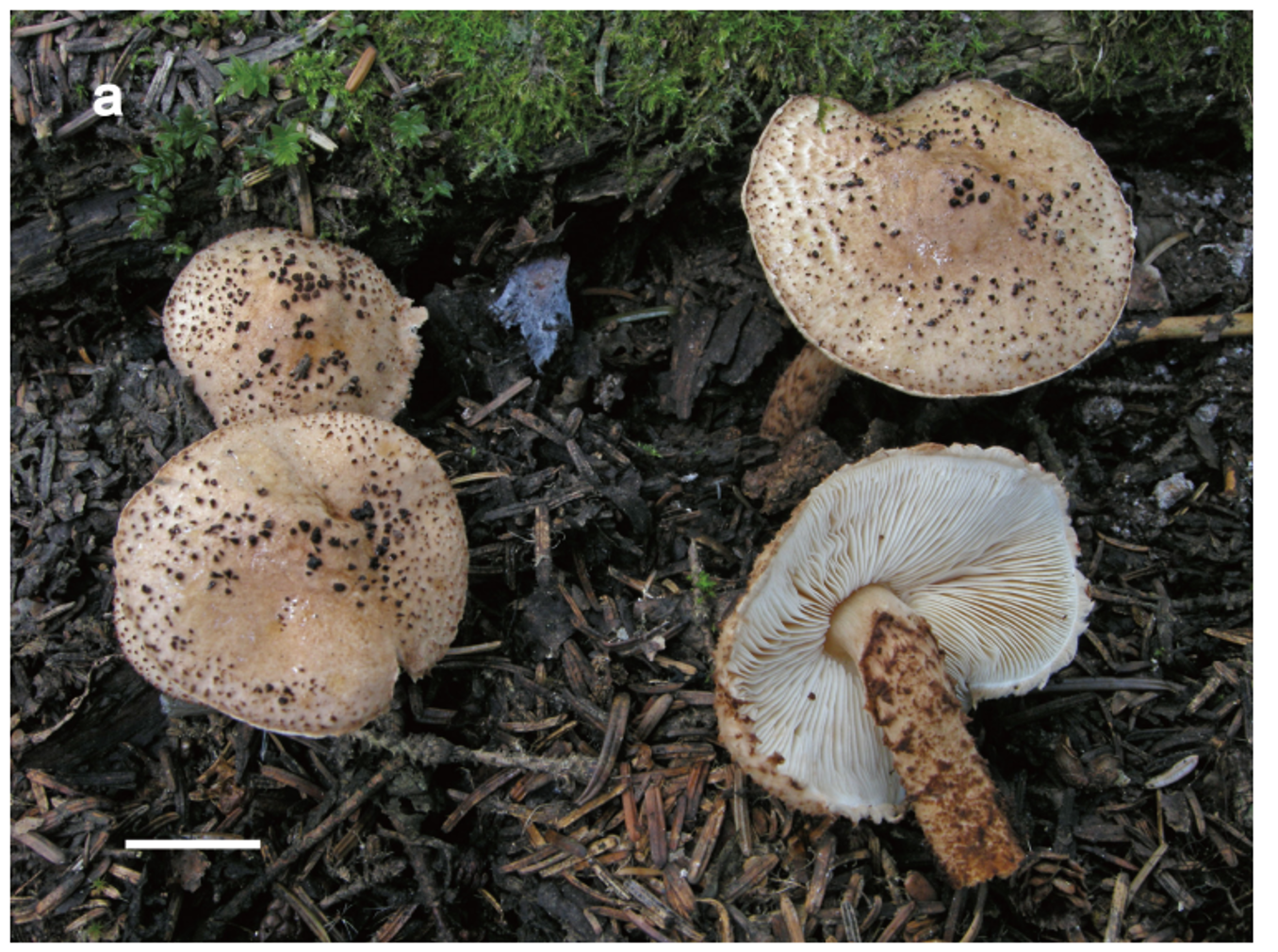刺鳞环柄菇Lepiota echinacea
J.E. Lange 1940
基本信息 | - 通用中文名Chinese name:刺鳞环柄菇
- 拉丁学名Scientific name:Lepiota echinacea J.E. Lange 1940
- 科family:疣孢环柄菇科Verrucosporaceae
- 属Genus:环柄菇属Lepiota
- 分布Distribution:在我国分布稀疏(甘肃、黑龙江)但潜在分布地区可能较广
- 有分布的省区Provinces:甘肃省,黑龙江省
- 生态Ecology:秋季生于针叶林或混交林(紫果云杉Picea purpurea,巴山冷杉Abies fargesii,桦属物种Betula sp.)中。
- 营养类型Nutrition Type:腐生Saprotrophic: 分解死亡生物体或有机物获取养分
- 置信指标Confidence:★★★
|
介绍部分
简介:刺鳞环柄菇是相对比较少见的物种。它的主要特征是菌盖污白色至淡黄褐色,北深褐色刺状鳞片;菌柄污白色,被毛绒状褐色鳞片;菌褶白色,离生;担孢子相对较大,无囊状体。
分布
本种原描述于丹麦,在欧洲它是一个分布广泛但少见的物种。在我国它的潜在分布也可能很广。
相似物种
本物种的担孢子为椭圆形至长方椭圆形,5-6(-6.2)×2.5-2.8(-3)μm,平均长宽比1.85±0.14(这一点和
L. omninoflava相似,但
L. omninoflava菌柄更细,颜色显著有差异,呈黄色)。
本物种和各种具有锥状鳞片的环柄菇物种都相似,如
L. asperula,
L. jacobi,
L. pseudoasperula,
L. carinii等,它们的担孢子更小,
L. asperula的菌盖粉褐色至橄榄褐色,
L. jacobi的菌盖灰色至深褐色,
L. pseudoasperula菌盖褐色至红褐色,
L. carinii的褶缘囊状体棒状至近圆柱形。
锐鳞环柄菇(及近似种)和本种的区别是体型更大,菌盖颜色更深(本种污白色至淡黄褐色),担孢子更大,平均长宽比2.45±0.27(锐鳞环柄菇近似种)。
涉及到该物种的相关文献
(能证明该种在我国有分布的文献)
- New species of Echinoderma and Lepiota (Agaricaceae) from China, 2020. Ya-Jun Hou, Zai-Wei Ge. Phytotaxa 447(4): 221-236 https://doi.org/10.11646/phytotaxa.447.4.1
- 大小兴安岭地区伞菌和牛肝菌类区系【附录1】大小兴安岭地区伞菌和牛肝菌类物种名录, . .
物种描述
以下描述摘自相关参考文献,仅供参考。可能存在文献过时、描述错误或者描述片面等情况
文字识别时可能有纰漏,描述若与参考文献原文有出入以原文为准
外文描述的参考翻译系网站管理者的个人翻译,仅供参考,具体以原文为准
描述1 描述来源:New species of Echinoderma and Lepiota (Agaricaceae) from China类型:完整的描述(摘录自专著、论文等)
描述原文:
Lepiota echinacea J.E. Lange, Flora Agaricina Danica 5: V (1940)
≡Cystolepiota echinacea (J.E. Lange) Knudsen, Botanisk Tidsskrift 73: 127. 1978.
≡Echinoderma echinaceum (J.E. Lange) Bon [as ‘echinacea’], Documents Mycologiques 21 (82): 63. 1991.
Description:—Basidiomata (FIG. 6a) small to medium. Pileus 20–56 mm, at first nearly hemispherical, then convex to plano-convex, finally expanded, dirty white (1B1) to fawn (1B4), covered with coarse, pyramidal, easily separable squamules, dark brown (1F8), sometimes with darker or blackish apex, squamules also present at margin, and tend to disappear starting from the center; context white. Lamellae moderately crowded, free, white (1A1) to cream-colored (2A2). Stipe 40–95 × 4–9 mm, subcylindrical or slightly tapering upward, with apex slightly expanded, dirty white (1B1) to fawn (1B4), at first a fluffy brown (4C8) veil connect it to the pileus, then detached and formed a net-like annular zone, above this zone nearly smooth, below this zone covered with fluffy brown squamules, veil at the base thicker. Lacking a distinctive odor.
Lamellar trama regular, consists of hyphae 3–12 μm in diam. Basidia (FIG. 7b) 12–22 × 6–8 μm, clavate, 4- spored; sterigmata 2–3 μm long; sometimes with clamps on basal septa. Basidiospores (FIG. 7a) [40/2/1] 5.0–6.0(–6.2) × 2.5–2.8(–3) μm, Q = 1.67–1.93(–2), Qm = 1.85 ± 0.14, ellipsoid to oblong, dextrinoid, colorless, thin-walled, smooth; apiculus small. Pleurocystidia absent. Cheilocystidia not observed. Squamules (FIG. 7c) composed of subsphaeroidal, cylindric, and globose cells (10–30 × 13–55 μm) arranged in chains, the elements with light dark brown intracellular pigments, thick-walled. Clamp-connections present.
Habitat and distribution:—Scattered in coniferous or mixed forests. Not previously reported from China. A rare but widespread species originally described from Denmark.
Specimen examined:—CHINA. Gansu Province: Gannan Tibetan Autonomous Prefecture, scattered and saprotrophic in spruce and birch forest, elevation 3082 m, 10 September 2018, S.P. Jian 257 (HKAS 105582!)
Comments:—Lepiota echinacea is an uncommon or rare yet widely distributed species and it is characterized by its dirty white to fawn pileus covered with dark brown acute squamules, dirty white stipe covered with fluffy brown squamules, larger basidiospores and the lack of cystidia. The macro- and microscopic characters of the collection from China match well with the original description of L. echinacea by Lange (1940). Bon (1991) placed this species in the genus Echinoderma based on the similar structure of the squamules. However, in our phylogeny this species is resolved in the genus Lepiota based on both molecular and morphological evidence. Our collection also represents a first record for China. This species is found in forests dominated by Picea purpurea, Abies fargesii and Betula sp. This species is closely related to L. asperula, L. jacobi, L. carinii and L. omninoflava, but morphologically different (refer to comments under Lepiota omninoflava).
库中图片 1 张
标签:环柄菇类真菌 上次编辑:2023-04-21
物种编号:40
Revised:false
本页向外链接的参考文献:总计 4 条链接(含重复)
重定向至本页的页面:总计 1 条链接©菌物志Mycopedia
回到首页 搜索物种 目录
©菌物志Mycopedia,版权声明
如需引用本文可参考下列格式:
蔡佳铭.2023. 刺鳞环柄菇Lepiota echinacea. 菌物志Mycopedia. http://www.mycopedia.top/result.php?details=Lepiota echinacea
Jia-Ming Cai.2023. Lepiota echinacea [Chinese]. Mycopedia. http://www.mycopedia.top/result.php?details=Lepiota echinacea

